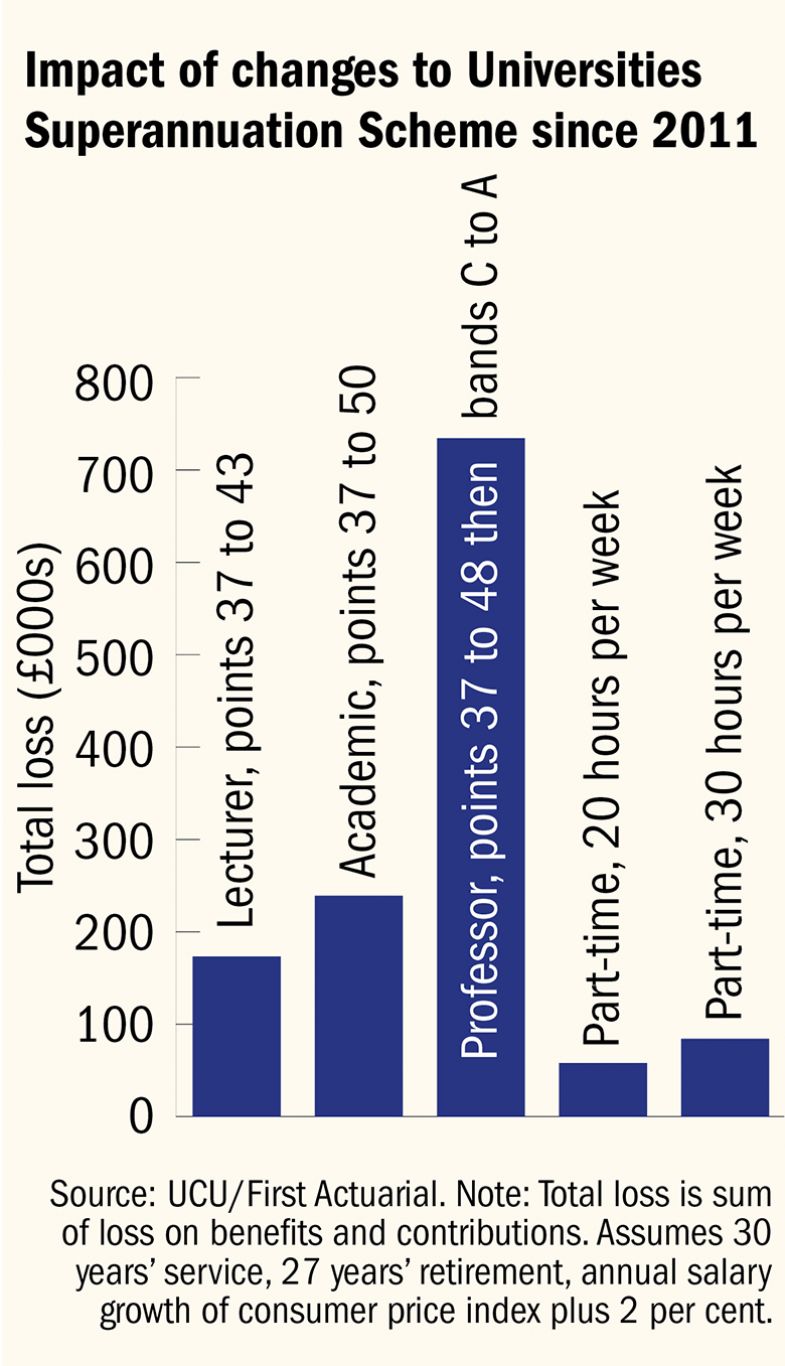Typical members of the UK’s Universities Superannuation Scheme will find themselves nearly £240,000 worse off in retirement as a result of changes made to pension contributions and benefits since 2011, according to a new analysis.
The study, commissioned by the University and College Union, says that high earners such as senior professors could end up more than £700,000 out of pocket. It was released ahead of the opening on 9 September of a ballot for industrial action over the latest changes to the scheme, which will increase members’ contributions to 9.6 per cent of their salary – up from 8.8 per cent currently, and 8 per cent before April.
The UCU modelling, conducted by First Actuarial and published on 4 September, calculates the cost of changes to contributions and benefits since the closure of the USS’ final salary scheme to new entrants in 2011, including the increase to 9.6 per cent.
It says that a typical academic with 30 years’ service who joined the scheme on point 37 of the national pay scale (currently £40,792) and retires on point 50 (£59,828) will be £239,200 worse off in retirement on the current terms, compared to the pre-2011 scheme.
This is the sum of a £40,900 increase in contributions and a £198,300 reduction in benefits, assuming annual salary growth of inflation plus 2 per cent.
Impact of USS changes at each pay scale

For a professor who moves up to the top of the professorial pay scale, the total loss comes to £734,400.
Presuming scheme members take a lump sum on retirement, this leaves the typical academic with a net annual pension of £18,200, rather than £23,800 under the pre-2011 scheme, and senior professors with £21,100 a year, instead of £40,600.
Even if salary growth proves slower – inflation plus 1 per cent – the total losses would still be substantial, estimated at £138,000 for typical academics, leaving them with £16,700 a year, instead of £23,500. Senior professors would lose £576,200, leaving them with £19,700 annually, down from £34,700.
The USS scheme has about 200,000 active members, mainly in pre-92 institutions. Members at 65 institutions walked out for 14 days over proposed changes to pensions last year.
Jo Grady, UCU’s general secretary, said that members had “had enough”.
“Universities have to recognise the anger and frustration that members feel about the recent changes, how the scheme has been valued and how it has been run,” she said. “It is not good enough to come back time and again with proposals that force members to pay more for reduced benefits.”
The analysis was released amid growing rancour between UCU and Universities UK, which represents vice-chancellors. Employer contributions are due to increase from 19.5 per cent to 21.1 per cent and UUK offered an additional 0.5 per cent for two years in return for a two-year moratorium on strikes. This would have limited employee contributions to 9.1 per cent – the level proposed by a joint expert panel set up by UUK and UCU after last year’s strike.
The UCU said that a strike moratorium was a “ludicrous” condition and UUK has since said it would offer the extra money if the upcoming strike ballot was called off. Fresh talks were due this week and Dr Grady said that any “serious” offer would be considered by the union’s higher education committee on 6 September.
However, there are fears that further increases will be necessary, with volatile financial markets being blamed for an increase in the scheme’s estimated deficit to £6.6 billion – far higher than the £3.6 billion figure used to draw up the latest proposals.
A UUK spokesman said: “Since 2011, the cost of providing defined benefit pensions has risen because people are living longer, and the economic environment has fundamentally changed. Scheme members will realise that winding the clock back to 2011 and freezing the scheme in time is just not credible.
“Compared with 2011, employers are now paying more than £400 million extra per annum into USS – having increased their contributions from 16 per cent to 21.1 per cent of salary from October 2019. This is far more than most other private pension schemes. This seems to be completely absent from the analysis.
“Crucially, members will keep their current benefits, which in monetary terms are more valuable than ever given the increased cost of providing pension promises.”
The strike ballot, covering 69 institutions, is due to run until 30 October. It will run alongside a separate ballot across 147 campuses calling for industrial action over the 2019-20 pay offer. The Universities and Colleges Employers Association offered a 1.8 per cent minimum rise, but unions wanted inflation as measured by the retail price index – currently 2.8 per cent – plus 3 per cent, or £3,349, whichever is greater.
POSTSCRIPT:
Print headline: USS changes ‘leave UK staff £240K worse off’
Register to continue
Why register?
- Registration is free and only takes a moment
- Once registered, you can read 3 articles a month
- Sign up for our newsletter
Subscribe
Or subscribe for unlimited access to:
- Unlimited access to news, views, insights & reviews
- Digital editions
- Digital access to THE’s university and college rankings analysis
Already registered or a current subscriber?







